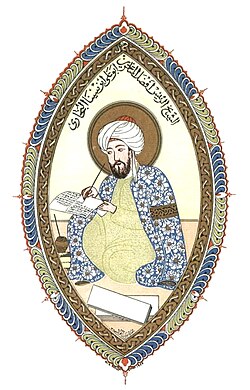Avicenna
English
Alternative forms
Pronunciation
- Lua error in Module:parameters at line 333: Parameter 1 should be a valid language or etymology language code; the value "UK" is not valid. See WT:LOL and WT:LOL/E. IPA(key): /ˌævɪˈsenə/
Proper noun
Avicenna
Derived terms
Derived terms
Translations
a Persian polymath
|
Italian

Etymology
From a Latinization of Persian ابن سينا (Ibn Sīnā).
Pronunciation
Proper noun
Avicenna m
- Avicenna (Persian polymath, 980 ca. C.E.–1037 C.E.)
- 1321, Dante Alighieri, La divina commedia: Inferno [The Divine Comedy: Hell], 12th edition (paperback), Le Monnier, published 1994, Canto IV, page 64, lines 140–144:
- […] e vidi Orfeo, ¶ Tulïo e Lino e Seneca morale; ¶ Eulide geomètra e Tolomeo, ¶ Ipocràte, Avicenna e Galïeno, ¶ Averoìs che ’l gran comento feo.
- and Orpheus saw I, Tully and Livy, and moral Seneca, Euclid, geometrician, and Ptolemy, Hippocrates, Avicenna, and Galen, and Averroes, who the great Comment made.
Derived terms
Further reading
 Avicenna on the Italian Wikipedia.Wikipedia it
Avicenna on the Italian Wikipedia.Wikipedia it
Categories:
- English 4-syllable words
- English terms with IPA pronunciation
- English lemmas
- English proper nouns
- English uncountable nouns
- en:Individuals
- Italian terms derived from Persian
- Italian 4-syllable words
- Italian terms with IPA pronunciation
- Rhymes:Italian/ɛnna
- Italian lemmas
- Italian proper nouns
- Italian proper nouns with irregular gender
- Italian masculine nouns
- Italian terms with quotations
- it:Individuals
